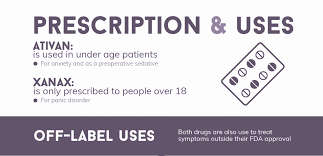Ativan, also known by its generic name lorazepam, is a prescription medication commonly used to treat anxiety disorders, insomnia, and other related conditions. As a benzodiazepine, Ativan works by enhancing the effects of a neurotransmitter called gamma-aminobutyric acid (GABA) in the brain, resulting in a calming and sedative effect. If you believe that Ativan may be beneficial for your medical condition, it is important to follow the appropriate steps to obtain a prescription from a qualified healthcare professional.How To Get Ativan Prescribed
- Understand the Indications for Ativan: Ativan is typically prescribed for the treatment of anxiety disorders, including generalized anxiety disorder (GAD), panic disorder, and social anxiety disorder. It may also be prescribed for the short-term management of insomnia and as a pre-anesthetic medication for surgery. Understanding the approved indications for Ativan can help you determine if it may be appropriate for your condition.
- Seek Medical Evaluation: The first step in obtaining a prescription for Ativan is to seek medical evaluation from a qualified healthcare professional, such as a physician, psychiatrist, or nurse practitioner. Schedule an appointment to discuss your symptoms, medical history, and any relevant information with the healthcare provider. Be honest and thorough in providing your medical history, including any previous or current medical conditions, allergies, medications, and substance use. This information will help the healthcare provider make an informed decision about whether Ativan is appropriate for your condition.
- Describe Your Symptoms: During the medical evaluation, clearly describe your symptoms to the healthcare provider. Provide details about the nature, frequency, and duration of your anxiety symptoms or sleep difficulties. Be specific about how your symptoms are affecting your daily life, such as work, school, relationships, and overall quality of life. Providing accurate and detailed information about your symptoms can help the healthcare provider determine if Ativan may be an appropriate treatment option for you.

Side Effects:
Ativan may cause side effects. Common side effects of Ativan may include drowsiness, sedation, dizziness, weakness, and memory impairment. It may also cause less common but more severe side effects such as respiratory depression, paradoxical reactions (e.g., increased agitation or aggression), and allergic reactions. It is important to be aware of the potential side effects of Ativan and to promptly report any unusual or severe symptoms to your healthcare provider.
Avoid Self-Medication or Unreliable Sources
It is crucial to avoid self-medicating with Ativan or obtaining the medication from unreliable sources, such as online pharmacies without a valid prescription. Only obtain Ativan from a reputable pharmacy with a valid prescription from a qualified healthcare provider. Self-medication or obtaining medication from unreliable sources can pose serious risks to your health, including potential adverse effects, interactions with other medications, and legal consequences.
Conclusion:
Obtaining a prescription for Ativan involves several important steps, including seeking medical evaluation from a qualified healthcare provider, describing your symptoms in detail, discussing treatment options, following treatment guidelines, discussing safety precautions, being aware of potential side effects, following up with your healthcare provider, avoiding self-medication or unreliable sources, and being honest with your healthcare provider.
It is crucial to prioritize your health and safety, and to use Ativan as prescribed by a qualified healthcare provider. If you believe that Ativan may be beneficial for your medical condition, consult with your healthcare provider to determine if it is an appropriate treatment option for you.